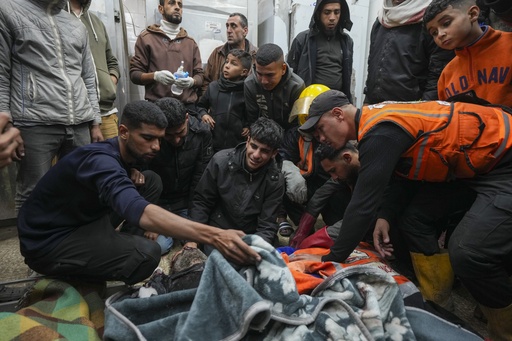DEIR AL-BALAH, Gaza Strip — On Sunday, the Israeli government announced it will shut down its embassy in Ireland amid escalating tensions related to the ongoing conflict in Gaza. Palestinian medical sources reported that new Israeli airstrikes resulted in the deaths of over 46 individuals, including various children.
This embassy closure is prompted by what Israel’s foreign minister has labeled as Ireland’s “extreme anti-Israel policies.” Earlier this year in May, Israel had already recalled its ambassador to Ireland when the country joined Norway, Spain, and Slovenia in recognizing a Palestinian state.
Just last week, the Irish government decided to intervene formally in South Africa’s case presented to the International Court of Justice, which alleges that Israel has committed acts of genocide in Gaza—a claim that Israel has vehemently denied. Ireland’s foreign affairs minister, Micheal Martin, expressed concern that a limited interpretation of genocide could create a scenario where the safeguarding of civilians is severely compromised.
In announcing the closure of the embassy, Israeli Foreign Minister Gideon Saar stated, “Ireland has crossed every red line in its relations with Israel.” In response, Irish Prime Minister Simon Harris referred to the embassy’s closure as “deeply regrettable.” He also took to the social media platform X to affirm, “I utterly reject the assertion that Ireland is anti-Israel. Ireland is pro-peace, pro-human rights, and pro-international law.”
Meanwhile, Israeli military operations continue to wreak havoc in Gaza. The number of casualties among Palestinians since the outset of the conflict has now soared towards 45,000. Over the weekend, a significant explosion illuminated the southern Gaza landscape, following an Israeli airstrike on a school in Khan Younis that claimed at least 16 lives, as reported by Nasser Hospital, where the victims’ bodies were taken. At the time of writing, there had been no immediate statement from the Israeli military regarding this attack.
In northern Gaza, an airstrike targeted the Khalil Aweida school in the town of Beit Hanoun, resulting in the deaths of at least 15 people, as stated by Kamal Adwan Hospital. Among the deceased were a mother, a father, their daughter, and another father with his son.
Additionally, in Gaza City, three airstrikes against residential buildings sheltering displaced families killed at least 17 individuals, including six women and five children, according to Al-Ahli Baptist Hospital. Reflecting on the tragedy, Yahia al-Yazji, a survivor who sustained injuries, lamented the loss of his wife and daughter. “I found my wife with her head and skull exposed, and my daughter’s intestines were gone. My wife was three months pregnant,” he painfully recounted while his hand rested on a body covered in a blanket.
Israel’s military claimed that its operations targeted a “terrorist cell” located in Gaza City and a “terrorist meeting point” in Beit Hanoun. Among those killed was an Al Jazeera journalist, Ahmed al-Lawh, whose death was confirmed by both a hospital and the Qatar-based television network. The strike also claimed the lives of three members of Gaza’s civil defense, which serves as the primary rescue agency in the region. One of the deceased was found wearing an orange work jacket marked “ambulance” in English.
In a poignant expression of their plight, a colleague from the civil defense remarked, “We are carrying out humanitarian work like in any country. Why are we being targeted?” The Israeli military, however, maintained that the airstrike was directed at a militant command center located within the civil defense premises.
The violence erupted following an assault by Hamas and other militant groups on southern Israel on October 7, 2023, leading to the deaths of approximately 1,200 people and the abduction of over 200 individuals. The retaliatory strikes by Israel have resulted in almost 45,000 Palestinian deaths, according to figures from Gaza’s Health Ministry. Notably, the ministry does not distinguish between combatants and civilians, stating that a significant proportion of those killed are women and children.
With a population exceeding 2 million, most of Gaza’s residents have been displaced multiple times throughout the conflict. Functional hospitals report severe shortages of medications, fuel, and essential supplies, and humanitarian organizations warn of widespread starvation.
Cindy McCain, the head of the World Food Program, highlighted the dire situation in an interview, noting that in November, the agency managed to send only two trucks of supplies into Gaza due to ongoing insecurity. “We need a ceasefire now,” she emphasized. “We can no longer afford to stand by and witness these individuals starve to death.”


